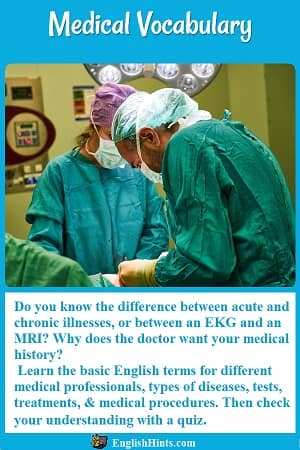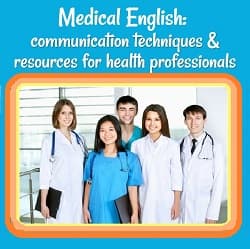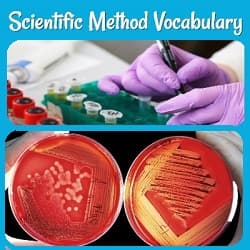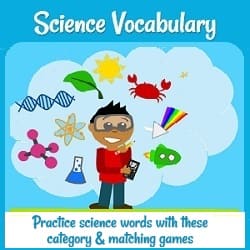Basic Medical Vocabulary
Learn or review basic medical vocabulary here. This page looks at titles for healthcare personnel and words for diseases, medical tests, and treatments.
These are words in common use by both medical professionals and the general public. They're useful for anyone who gives or receives health care. (The most basic words of all are in bold type.)
After looking them over, take a short Medical Vocabulary Quiz to check your understanding. (Click the links above to go directly to each part of the page.)
Titles of Medical Professionals
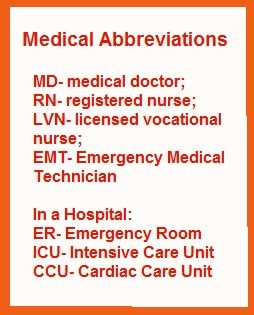
The title ‘doctor’ refers either to medical doctors (physicians) or to people with a doctorate, a PhD. (They include psychologists, university professors, and some other specialties.)
An M.D. after a person’s name always means they are a medical doctor. In everyday speech we always talk about going to the doctor, never “to the physician.”
Some common medical specialties:
- Surgeons perform surgery. (They “operate on” people--cutting into their bodies to remove cancers or repair damaged tissues, etc.)
- Anesthesiologists administer anesthesia so patients will not feel pain during surgery.
- Radiologists interpret X-rays.
- General practitioners (G.P.s) are primary care physicians. They may see their patients every year for a “check-up” when healthy. They are usually the first providers of care when patients are ill.
- Pediatricians care for children.
There are many other specialties, including cardiologists (heart doctors), dermatologists (for skin diseases), oncologists (cancer doctors), and internists (like GPs except emphasizing the internal organs—heart, stomach, etc.).
Other types of healthcare professionals include:
- nurses,
- EMTs (Emergency Medical Technicians who help in ambulances, etc.),
- pharmacists who prepare and dispense drugs,
- dentists (as well as orthodontists, dental hygienists, and dental assistants) who work on teeth,
- & medical social workers.
They usually work in clinics, private doctor or dentists' offices, or hospitals
Hospitals have emergency rooms-- ERs-- where people go for medical emergencies. (These include heart or breathing problems, injuries, or illnesses that need immediate attention. Often people arrive at an ER by emergency vehicles called ambulances.
Urgent Care Clinics are like private emergency rooms).
Pharmacists work in drug stores (pharmacies.)
Medical Vocabulary for Diseases
There are various words for health problems in English. When people don’t feel well, especially if their problem may be caused by a virus or bacteria, we say they are ‘sick.’ ( ‘Ill’ means the same but is more formal.) If illnesses or sicknesses are serious or long-lasting, we call them diseases.
Injuries are damage to body parts or organs. Cuts and wounds are breaks in the skin. Cuts are minor; wounds are deeper or large. Other injuries include burns, broken bones, torn muscles or twisted ankles or other joints.
Types & Causes of Disease:
Diseases have many possible causes. Some, like cancers, are the results of abnormal changes in normal body processes.
Some have a genetic component. (They are caused or affected by the genes a person receives from their parents.)
Many are caused or aggravated (made worse) by environmental or lifestyle
factors. These include smoking, air pollution, overeating, or lack of exercise.
Some diseases are degenerative. They get worse over time as tissue breaks down due to age or internal processes. Examples are arthritis, diabetes, many dementias, and many gastrointestinal, heart, and lung diseases.
(There's a review of the nervous system and its degenerative diseases at Nervous System Vocabulary. It also has a crossword puzzle to practice that vocabulary.)
Other diseases like malaria, hookworm, tuberculosis, cholera, AIDS, or the flu, are infectious. They're caused by microorganisms like viruses, bacteria, fungi, or parasites. (A few have visible parasites like various kinds of worms.)
If the disease is easily spread from one person to another, it’s ‘communicable.’ (There is simpler related vocabulary in Types of Germs.)
Diseases can be acute (sudden onset, short duration) or chronic (lasting years.) Diseases that are ‘endemic’ to a region occur in limited numbers but never completely disappear from the area.
Epidemics are fast-spreading diseases. They quickly infect a large part of the population and have high mortality (death) rates. Famous epidemics include the Black Death—bubonic plague—in the Middle Ages and the 1918 flu.
Medical Tests
A diagnosis is a doctor's decision about what a patient’s disease or problem is. Doctors base their diagnoses on a combination of symptoms, observations, and tests.
Misdiagnoses can lead to ineffective treatments and even fatalities. That's why a physical exam and medical tests have become an important part of medical care. The doctor wants to consider all the evidence he or she needs to make an accurate diagnosis.
In a physical exam, a doctor examines his (or her) patient and checks the patient's vital signs. (These include the pulse, temperature, blood pressure, and respiration-- breathing.) The doctor also asks questions (takes a medical history.)
Often the patient will complete a medical history form before the exam. That way the doctor will already have the basic information about the patient (and family’s) health experience. The doctor may also request various tests.
In addition to several types of blood test, the doctor may order
- a urinalysis (chemical test of the urine),
- an ultrasound,
- X-rays,
- an MRI (Magnetic Resonance Imaging),
- a CT (Computed Tomography) scan,
- an EKG or ECG (electrocardiogram, to check the heart),
- a colonoscopy (to check the large intestine),
- or a biopsy (a small sample of tissue cut out of an organ to check for cancer, etc.)
Treatment Vocabulary
After making a diagnosis, a doctor usually prescribes one or more treatments to help the patient get better.
Medications (or medicines) can also be called ‘drugs.’ A drug is a substance that affects the body or the mind. Drugs can be legal (either prescribed or over the counter) or illegal. (‘Drug’ can also be a verb, meaning to give a person a drug. If someone is ‘drugged’ they are under the drug’s influence.)
A medication is a medicine prescribed by a doctor (to ‘medicate’ is to treat with medicines.) Medicines also include over-the-counter (OTC) drugs. Anyone can buy an OTC medicine at a drugstore or pharmacy without a doctor’s prescription.
Families and traditional healers have used herbs and other home remedies for centuries to treat illnesses and injuries. (Tests have shown some to be as effective as current pharmaceutical drugs.) People sometimes also ‘self-medicate’ with whatever they think will make them feel better.
'Medicine' sometimes means the art that doctors practice rather than a drug. Hippocrates is called "the father of modern medicine." He laid the foundations of good medical practice.
Types of Medications
A small solid medication taken by mouth (whether it’s a gelatin capsule or a tablet) is called a pill. There are also liquid, topical, and injected medications. Topical means applied externally, to the skin: creams, lotions, and ointments.
Injections are often called 'shots' in casual speech. Injections can be subcutaneous (just under the skin) or intramuscular (into the muscle). Intravenous transfusions (IVs) are given directly into the veins, usually over a period of time.
The dose or dosage refers to the amount and frequency of the medication. Frequency can vary from every hour to once or several times a day. (It can also be p.r.n, which means "as needed.")
When doctors prescribe medicines, they consider possible toxicity and side effects. Side effects are unintended harmful results. They range from minor problems like an upset stomach to very serious complications.
Vocabulary for Other Treatments
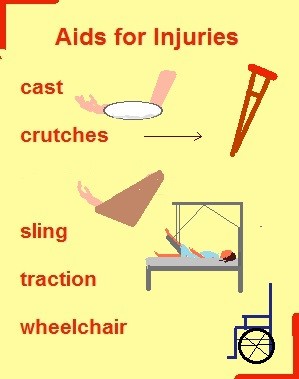
Aids for broken bones or injured joints:
- a brace or splint to keeps arm or leg straight,
- a cast to keep a limb or joint immobile,
- an elastic bandage to support joints & prevent twisting,
- crutches to enable walking without putting weight on an injured leg or ankle,
- a sling to support the weight of an injured arm and limit its movement,
- traction to hold a leg in the best position for healing (the mechanism holds the leg above the bed)
- a wheelchair to enable change of location without walking
General Treatments:
- lifestyle changes like a healthier diet, exercise, stress relief, and rest
- surgery (Careful aseptic technique is important to prevent infection since the surgeon will cut through the skin’s protective barrier). Some minor surgeries are outpatient. (They allow the patient to go home soon after the surgery is over.) Most require a hospital stay.
- physical therapy (especially after surgery or for musculoskeletal injuries)
- oxygen therapy (for lung diseases)
- chemotherapy or radiation (for cancer)
- kidney dialysis (for kidney failure, often from long-term diabetes)
- implanting a pacemaker to control heart rhythms
- organ transplants
Medical Vocabulary Quiz
Instructions: Choose the best answer or answers for each question. Then check your answers. (Some of these will require inferences: logical guesses based on your knowledge plus the information above.) Click the right arrow to go on to the next question.
Try These Pages Related to Medical Vocabulary:
Learn the medical English you need to ask your patients or clients questions, report observations, & give clear explanations & instructions.
An explanation of the scientific method & its vocabulary (bias, conclusions, data, evaluation, evidence, hypothesis, etc.)
How much of this science vocabulary do you know? Find out with these category and matching games.
Home> Learn English Vocabulary> Medical Vocabulary.
Didn't find what you
needed? Explain what you want in the search box below.
(For example, cognates, past tense practice, or 'get along with.') Click to see the related pages on EnglishHints.
| site search by freefind | advanced |
